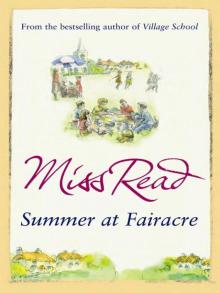Read (16/20)Summer at Fairacre Storyline:
From Publishers WeeklyTo say that for those who like this sort of thing this book is definitely the sort of thing they like is generally understood to be damning with faint praise, but in this case it should be understood as an accolade. Miss Read's loving evocation of life in the Cotswold village of Fairacre tells us that it is possible to go home again, even to a place that does not exist at all, and never did. Fairacre is the English village of our collective unconscious, a thoroughly nostalgic creation. Dora Saint, writing under the nom de plume and in the character of "Miss Read," English schoolteacher, has written 40 books about village and country life. Since the 1950s, Summer at Fairacre and its companion volumes (Village School and Village Centenary) have been reissued many times in England. All three are now being published in the U.S. for the first time in trade paperback. In this particular installment, the central drama such as it is revolves around the bad behavior of Miss Pringle, the crotchety school cleaning lady, who quits in a huff and only returns after much to-ing and fro-ing. Miss Read, a gentle soul with a kindly interest in all around her, is the master of the kind of detail that shows place and character in delicate focus, reporting on the behavior of bees and swallows and Tibby, her cat, and, of course, on her neighbors. For those who miss the Waltons, or who can't get enough of Jan Karon, Fairacre is an excellent place to visit. (May 15)Forecast: Houghton Mifflin is hoping to introduce a whole new generation of readers to Miss Read with these reissues. It may be more of a challenge this time around, but there's no underestimating the power of rural English charm.Copyright 2001 Cahners Business Information, Inc.Review"If you've ever enjoyed a visit to Mitford, you'll relish a visit to Fairacre." -- Jan KaronPages of (16/20)Summer at Fairacre :
